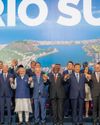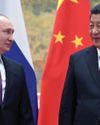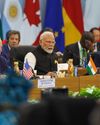
India and South Africa are two countries held so closely by bonds of sentiment, common values, and shared experience, by the affinity of cultures and traditions and by geography', President Mandela. Both countries have a basic and distinctive relationship that dates back several centuries and is based on shared principles, concepts, interests, and figures like Mahatma and Mandela. Nonetheless, because of South Africa's apartheid regime, their bilateral relationship remained tense for a very long period and was reopened only after the end of the apartheid regime in the early 1990s. The mutual experiences and strength of India and South Africa have shaped their visions - how both would have to see the world together; and the obligation to enrich the lives of mankind is engraved in their foreign policies as they share the same path of the struggle for freedom against colonialism. Speaking at Jawahar Lal Nehru University in December 1996, the then Deputy President Thabo Mbeki observes that 'Our common hope of success will depend on our ability to act together. We are reassured that we can count on India as our strategic partner in this historic endeavour which seeks to give birth to a new world order of just and lasting world peace, of prosperity for all peoples and equality among nations'.
Historical Background
This story is from the April 2023 edition of Extraordinary and Plenipotentiary Diplomatist.
Start your 7-day Magzter GOLD free trial to access thousands of curated premium stories, and 9,000+ magazines and newspapers.
Already a subscriber ? Sign In
This story is from the April 2023 edition of Extraordinary and Plenipotentiary Diplomatist.
Start your 7-day Magzter GOLD free trial to access thousands of curated premium stories, and 9,000+ magazines and newspapers.
Already a subscriber? Sign In

CONNECTIVITY CORRIDORS: India's Gateway to South and Central Asia
India holds a geostrategic position on the Indian subcontinent. Its location is more significant given the sharing borders with all the South Asia neighbouring and Central Asia making it an extended neighbourhood region. However, connectivity has not remained in the regional integration framework of the South and Central Asian regions. No matter how hard the regional leadership had worked on this, the optimal result has not been reached yet given the various geopolitical and geostrategic dynamics.

Poland's EU Presidency in 2025: Priorities and Challenges for Europe
Poland's presidency of the Council of the European Union in 2025 is at a critical convergence, where composite geopolitical and economic dynamics complications intersect to shape Europe's future path (Saussay, 2024).

Climate Diplomacy in 2025: A Focus on India's Leadership in COP30
The UN Climate Change Conference (UNFCCC COP 30) convenes in November 2025 in the Brazilian city of Belém, the closest major city to the mouth of the Amazon.

Technology Diplomacy in 2025: India's Role in Regulating AI and Data Governance
In multiple bustling cities in India, teams of young techies are crafting algorithms that power rural diagnostics. Meanwhile, India's voice echoes in global forums as it negotiates the rules of Al ethics.

Open Innovation, AI Water-Tech and Digital Twin: An Inconspicuous Emerging Phenomenon
Digital twin technology, a virtual replica of a physical system, is revolutionising the water sector. By creating detailed digital models of water infrastructure, such as pipelines, reservoirs, and treatment plants, water utilities can simulate various scenarios, optimise operations, and predict potential issues. Open innovation in this context involves collaboration between diverse stakeholders, including utilities, technology providers, researchers, and communities, to develop and share innovative solutions. By fostering collaboration and knowledge sharing, open innovation can accelerate the development and deployment of digital twin solutions, leading to more efficient, resilient, and sustainable water management.

G20 Summit in Brazil 5 Key Takeaways as World Leaders Met in Rio
Introduction - The 19th G20 Summit was held in Rio de Janeiro, Brazil, with the G20 Leaders' Summit taking place on November 18-19, 2024 under the theme 'Building a Just World and a Sustainable Planet'i. It was Brazil's first time hosting a G20 gathering.

Russia's Growing Engagement in Southeast Asia
Geopolitical Ambitions and Strategic Implications

CLIMATE DIPLOMACY IN 2025: A focus on India's leadership in COP 30
A focus on India's leadership in COP 30

Neighbourhood First Redefining India-Sri Lanka Relations
Introduction - Despite leading the traditionally pro-Chinese Janatha Vimukthi Peramuna (JVP) party, Sri Lankan President Anura Kumara Dissanayake chose India for his first overseas visit since taking office, reaffirming India's strong commitment to its “Neighbourhood First” policy.

India's Multilateral Diplomacy Key Engagements at the UN, G20, and BRICS in 2024
Introduction - The ongoing Russia-Ukraine war and the Israel-Hamas conflict have underscored a shift in global dynamics, with a growing emphasis on bilateral ties and regional alignments. India's diplomatic stance during the pivotal conflicts has been to consistently voice the concerns of the developing nations and champion fair and just treatment for all.